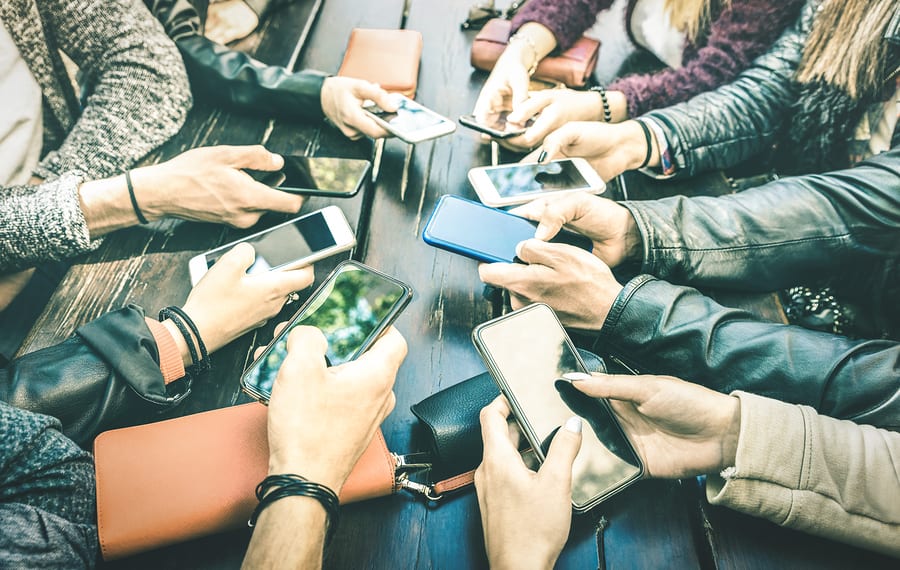Social media has very quickly integrated itself into every aspect of your day. When you wake up, you mindlessly scroll through your Facebook feed. Then, you catch the latest news on Reddit or Twitter as you sip your cup of morning coffee.
When your mind wanders at the office, you hop onto Instagram for a few minutes. You then get distracted again when your friend sends you a Snapchat. After work, you notice your cousin’s latest vacation photos on Facebook. You hit “like” to show your excitement, but deep down you feel jealous.
When it’s time to turn in for the night, you crawl into bed and shut off the lights. But instead of sleeping, you grab your phone and hop back on Reddit where you lose yourself in a sea of distressed and negative comments about the latest disaster that’s hit the news cycle.
Whether we like it or not, social media is part of our everyday lives. But while social media offers us opportunities like staying in touch with loved ones, it also has the power to influence your thoughts, feelings and overall wellbeing.
The Negative Effects of Social Media
Hearing that social media isn’t good for you probably isn’t a mind-blowing revelation. After all, plenty of news reports referencing correlations between social media and poor mental health have popped up over the years. However, given the connection it can bring, it’s difficult for many people to cut back or let go.
But does social media actually affect your mood and behaviors? Luckily, researchers have continued to dig deeper in search of more answers.
In a recent 2018 study, researchers from the University of Pennsylvania studied social media’s effects on depression, anxiety and loneliness. The study found that limiting social media use to 30 minutes a day actually decreased these conditions to help participants feel better.
Other studies have looked at how social media amplifies our inclination to compare ourselves to others. For example, one study found that women felt worse about themselves after interacting with social posts from someone they felt was more attractive than them.
And countless others have shown that symptoms of depression and anxiety can be made worse as a result of social media use. If you already struggle with low self-esteem and feeling inferior,
you’re more likely to compare yourself to others. Social media simply amplifies this toxic behavior by giving you easy access to what others post on their pages.
Besides increased feelings of depression, anxiety and loneliness and lower levels of self-esteem and self-worth, social media use has been linked to other effects like sleep deprivation, memory loss and a decreased attention span.
Why Does Social Media Affect Our Mental Health?
So, why does social media use have such an impact on our overall wellbeing? And even when we know the consequences, why do we keep scrolling through Facebook and Instagram?
The answer has to do with our brain’s reward system. When something good happens, a “feel-good” chemical called dopamine gets released. So, when you eat a delicious meal, exercise, win a competition or get a compliment from someone, dopamine helps you feel happy and satisfied.
The same is true with social media. As human beings, we’re all naturally seeking social validation from those around us. When you get a notification from Facebook or see someone reacting to your post, a rush of dopamine hits your brain that makes you feel good. This is similar to how drugs like opioids or cocaine make you feel.
And just like with drug use, your brain quickly learns to rely on social media notifications and public approval from others in order to feel good. Ultimately, this craving for hits of gratification on social media has you coming back again and again to check your news feed, even when you know it isn’t good for you.
How to Limit Social Media’s Negative Effects on Your Mental Health
Just like anything else, social media is a mix of good and bad. Social media platforms like Facebook, Instagram, Reddit and Snapchat have given us incredible opportunities to stay connected with our loved ones and learn more about the world around us.
But truth be told, experiencing the world is much more beneficial than learning about it on a tiny, bright smartphone screen.
If you’re looking to limit the negative effects of social media, start by cutting back on the amount of time you spend on it. Many smartphones can tell you how long you’re spending on social media to help you be more cognizant of your time.
Use that extra time to talk to a family member, friend or co-worker face-to-face. Take a walk outside or head to the gym for some exercise. Crack open that book you’ve been meaning to read. These activities are healthier for you and can make both an immediate and long-term difference in your mental health.
If you suffer from depression or an anxiety disorder, it’s even more important for you to engage in activities that don’t reinforce negative thoughts or emotions. Staying away from social media posts that trigger your mental health disorder can help you maintain a positive outlook on life and avoid the temptation for an immediate dopamine rush that you can get from drug use.
Get to the Bottom of Your Addiction at Fountain Hills Recovery
Effective addiction treatment takes more than simply addressing the substance abuse. In many cases, depression, anxiety or another mental health disorder is lurking below the surface, influencing your drinking or drug use.
At Fountain Hills Recovery, we take a personalized, dual diagnosis treatment approach to help you get to the bottom of what led to your substance abuse in the first place. Our staff can help you fully heal and learn to manage your co-occurring disorder in healthy ways, rather than only treating the symptoms of addiction.
To learn more about our approach to addiction treatment and our luxury residences where your loved one would stay, contact our admissions staff today at 888.549.4037.





